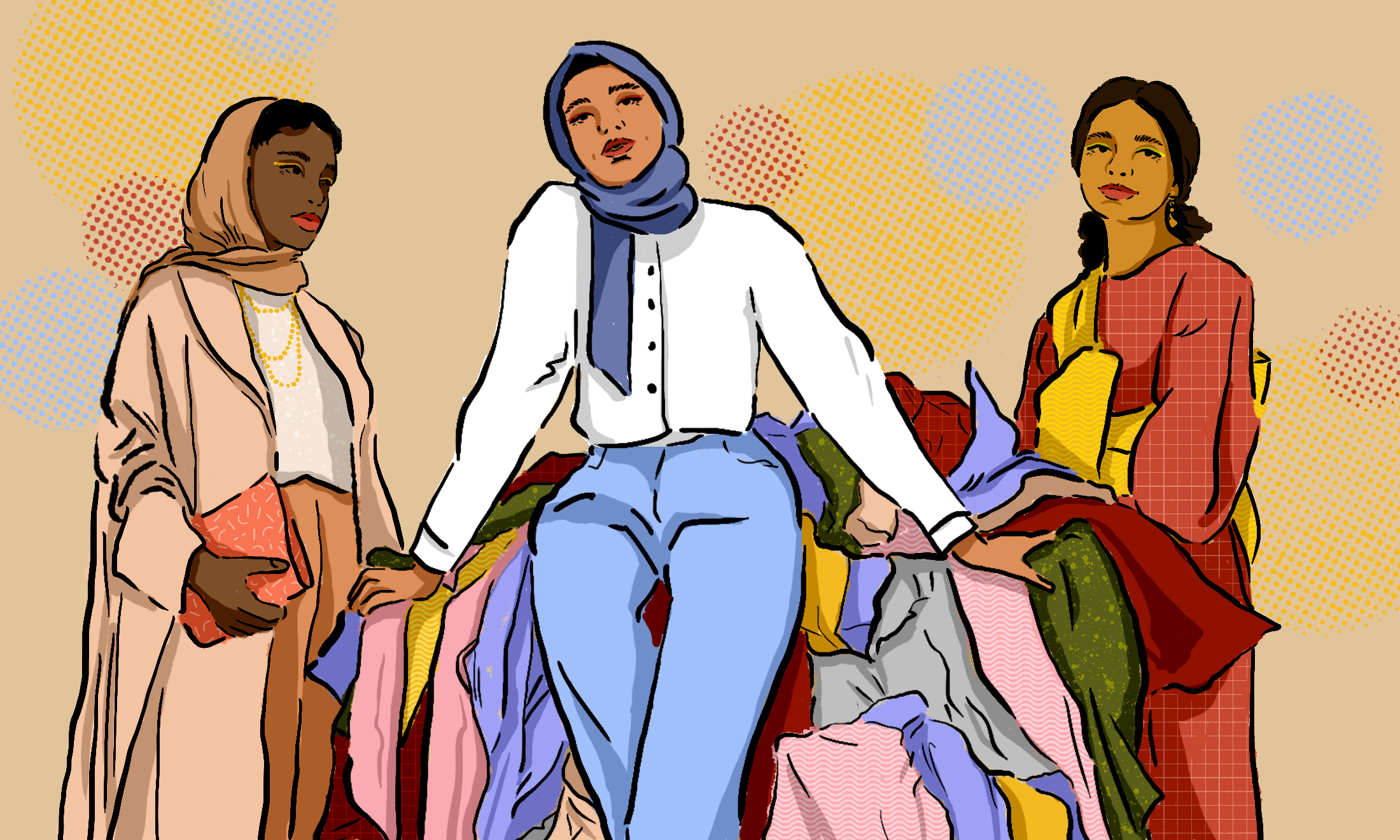
Illustration by Heedayah Lockman
The paradox of modest fast fashion
This Ramadan, I've been thinking about slowing down my clothing consumption against a backdrop of fast fashion seizing on modest clothes.
Zainab Mahmood
02 Apr 2022
At four years old I looked at Bollywood films for style inspiration, specifically the iconic Kuch Kuch Hota Hai. I desperately wanted big Anjali’s all-white shalvar kameez and red dupatta, as well as little Anjali’s pastel, looks from the summer camp scenes. The rise of blogging, vlogging and Instagram in my teens meant that I expanded my pool of influences to include South Asian and Muslim women, who I never saw in mainstream Western media. The Muslim YouTubers I began watching, who like myself were concerned about how to cover while still expressing their personal style, made me feel seen in a way mainstream media never did.
I know first-hand how alienating modest dressing can be in a non-Muslim context. As a child, I juggled the expectations of how I should dress from my parents and broader Pakistani Muslim community in London while being surrounded by peers who not only did not share my experience but in some cases made fun of it. Just as I established my own standard of modesty during my uni years, I decided to give up fast fashion and once again felt alienated for my fashion choices.
Within a few years of becoming obsessed with lookbook and haul videos, from both Muslim and non-Muslim creators, I became incredibly concerned about the fashion industry’s exploitation of garment workers – only 2% earn a living wage. And I especially started to become disillusioned with Muslim modest fashion influencers building their brands and accumulating wealth through affiliate links and haul videos sponsored by exploitative brands.
“as Muslims we’re taught to stand up against the oppressor and…so many garment workers in Muslim majority countries are the oppressed”
Asma Parvez
Asma Parvez, a US-based personal stylist catering to the needs of Muslim women, points out that “as Muslims, we’re taught to stand up against the oppressor and…so many garment workers in Muslim majority countries are the oppressed.” Muslim-majority Bangladesh is one of the biggest garment production centres in the world and over 84% of the cotton grown in China originates in Xinjiang province, where Uyghur Muslims face genocide. “We need to think twice before purchasing from and supporting the oppressor,” adds Asma. Similarly, Aisha Taras, a Canadian ethical fashion blogger living in the UK, states that “modesty is cutting out, essentially, capitalism, right? Islam doesn’t support capitalism, because capitalism is exploitation.”
Of course, under a capitalist society we are all but participants, whether willing or not, but it doesn’t feel that anti-capitalist principles in Islam are deterring Muslims from overconsuming just like their non-Muslim counterparts. Chapter 25 of the Quran says: ‘[True believers are] those who spend neither wastefully nor stingily, but moderately in between’ – but Muslims are projected to spend $311 billion on fashion globally by 2024 and continue to be entranced by tone-deaf modest collections and hijabi representation in campaigns for unethical brands.
Having been one of the first hijabi fashion bloggers in the 2010s, Asma knows that participation in unethical fashion from an influencer perspective comes from the desire to be accepted: “We just want so much to belong, that we’re willing to push aside our values, or not even really look too deep into what we’re doing. I really think that we need to aspire to more and as Muslims, we truly believe we’re going to be held accountable for every single thing we’ve done in this world.”
Ifrah Akhtar, 25-year-old editor-in-chief of MODEST magazine, is centred by the focus on justice in Islam, which drives the ethos behind the publication. “I feel like each point that is in the Quran, or through the Prophet’s life, kind of is backed up by a justice reason. What MODEST is trying to do is humanise the niche of modest fashion, basically, and that’s why sustainability [and] ethical supply chains is so important because it has that justice, religion informed background to it.”
“I also want that what I’m wearing reflects my respect for the world”
Ainara Medina
Zinia Khan, co-founder of Ardh, a marketplace for Black and brown owned ethical brands, has been working towards changing Muslims’ consumption habits through sharing Islamic teachings in workshops. By using the example of Prophet Muhammad (peace be upon him) naming each of his garments and repairing them when necessary, Zinia has got Muslims thinking about modest fashion beyond how they cover their bodies. Her own definition is “not just wearing clothes that are not showing your figure off, [but] wearing clothes that have been made sustainable, that [have] been made ethically.”
Ainara Medina, a 27-year-old Spaniard, struggled to find ethically produced hijabs and modest clothing when she first converted to Islam in her early 20s. She tells me that beyond covering, modest fashion promotes “humility, consideration for others, kindness,” values which are deeply ingrained into Nea Wear, the modest brand she founded in 2020. “I also want that what I’m wearing reflects my respect for the world. So, for example, the materials I’m wearing, are they organic? Are they sustainable?” Not only do organic fibres have a lower impact on the planet, but they’re better for our health. Synthetic fibres shed microplastics every time we move in them or wash them, contributing to the five grams of plastic we as humans ingest on a weekly basis.
Despite Ainara and Ifrah’s work being motivated by Islamic values, they both mention that, in addition to Muslim women, Nea Wear and MODEST also attract Christian and Jewish women who adhere to a certain standard of modest dressing. Whilst those standards of modesty can vary drastically, human connection and justice are values that transcend creed and culture. Individuals of all backgrounds want to resist unethical fashion and overconsumption – 90% of Gen Z users of popular clothing resale app Depop make changes to be more sustainable on a daily basis, with a focus on clothing.
“Modesty is cutting out, essentially, capitalism, right? Islam doesn’t support capitalism, because capitalism is exploitation”
Aisha Taras
This Ramadan is the perfect opportunity to start a slow fashion journey. This month, many of the world’s over 2 billion Muslims will restrain from eating and drinking during daylight hours as a test of faith. Why not extend this restraint to our consumption of clothes? It’s an immense privilege that I’ve been able to give up fast fashion almost entirely, but those who aren’t afforded that privilege can explore other actions like hosting a Ramadan or Eid themed clothes swap or learning to repair clothing.
Typical Muslim things like avoiding pork and alcohol, and fasting in Ramadan separate me from my non-Muslim counterparts, but at least feel normal in Muslim spaces. Transitioning away from buying fast fashion, however, has made me feel distant from everyone. Having said that, taking a stand against billionaire-owned fashion businesses and the consumerism shoved down our throats 24/7 has felt incredibly freeing and empowering. Connecting this choice to Islamic values feels like an act of worship on a daily basis.
Are you looking to get into ethical fashion? Here’s how to get started:
- Think long term: “Try not to follow trends. Buy clothing that you can wear all year round, clothing that will last a few years. Ask yourselves these questions before you purchase something, then I think it will leave a better impact.” – Zinia
- Don’t limit yourself to ethical brands: “There are so many ways that you can still be more mindful of the clothing that you wear, like thrifting or buying secondhand or repairing and mending clothes.” – Ifrah
- Look after and celebrate your clothes: “I would love to see modest influencers […] showing the care […] that goes into their clothing. Or maybe sharing the story of […] what certain clothing means to them.” – Ifrah
- If you have a public platform, take your influence seriously: “There should be some commitment towards making people understand that modesty goes beyond the outside image and also the things that you care for, how you are with others, with other people.” – Ainara
This article was amended on 4 April to state the correct spelling of Asma Parvez’ name. An earlier version mistakenly spelled it as Asma Pervaze.





